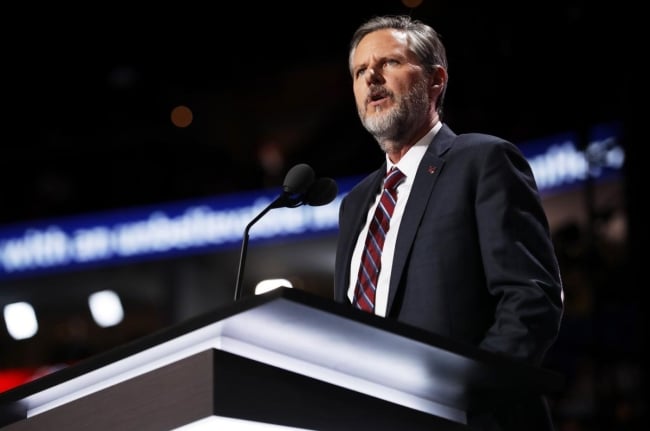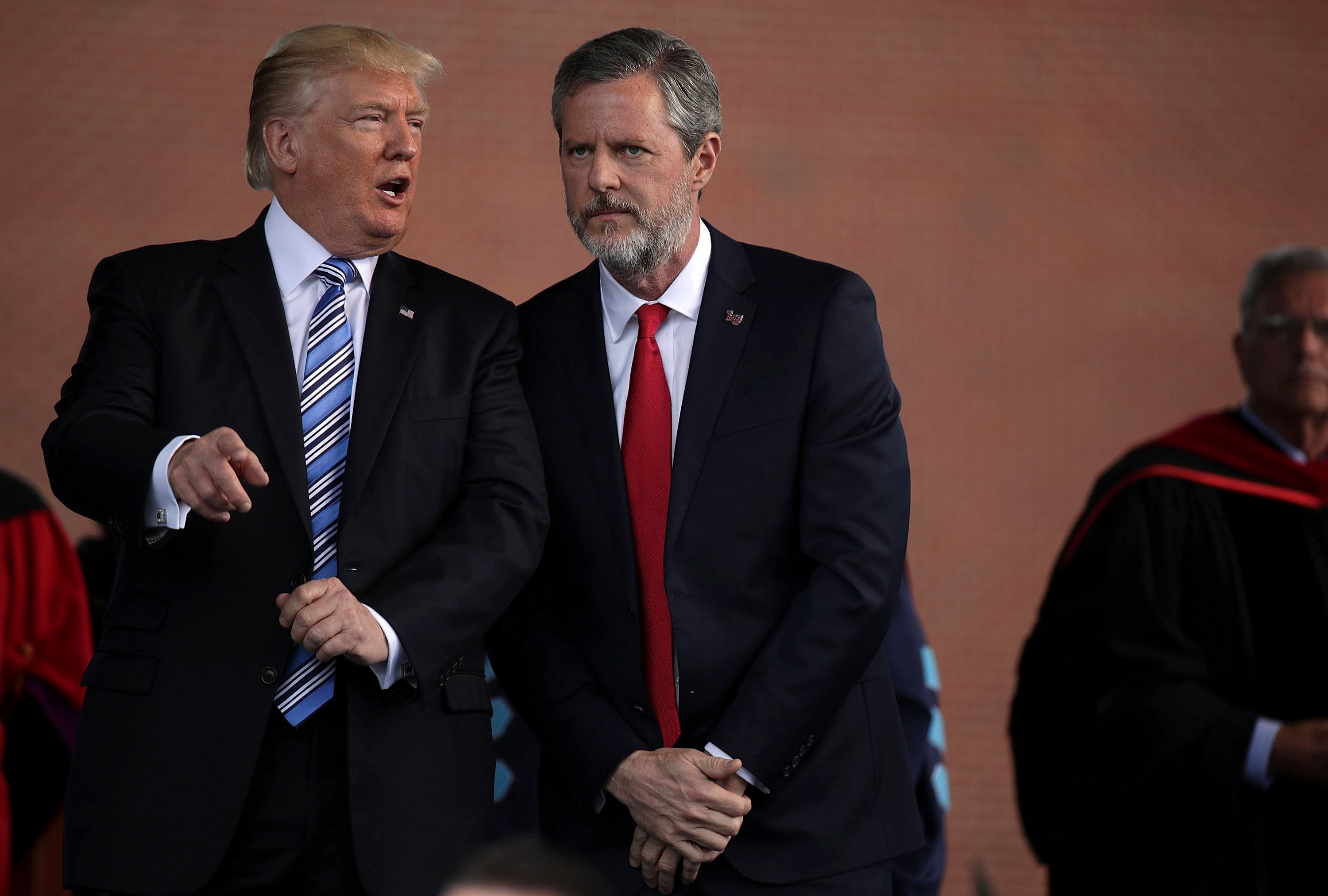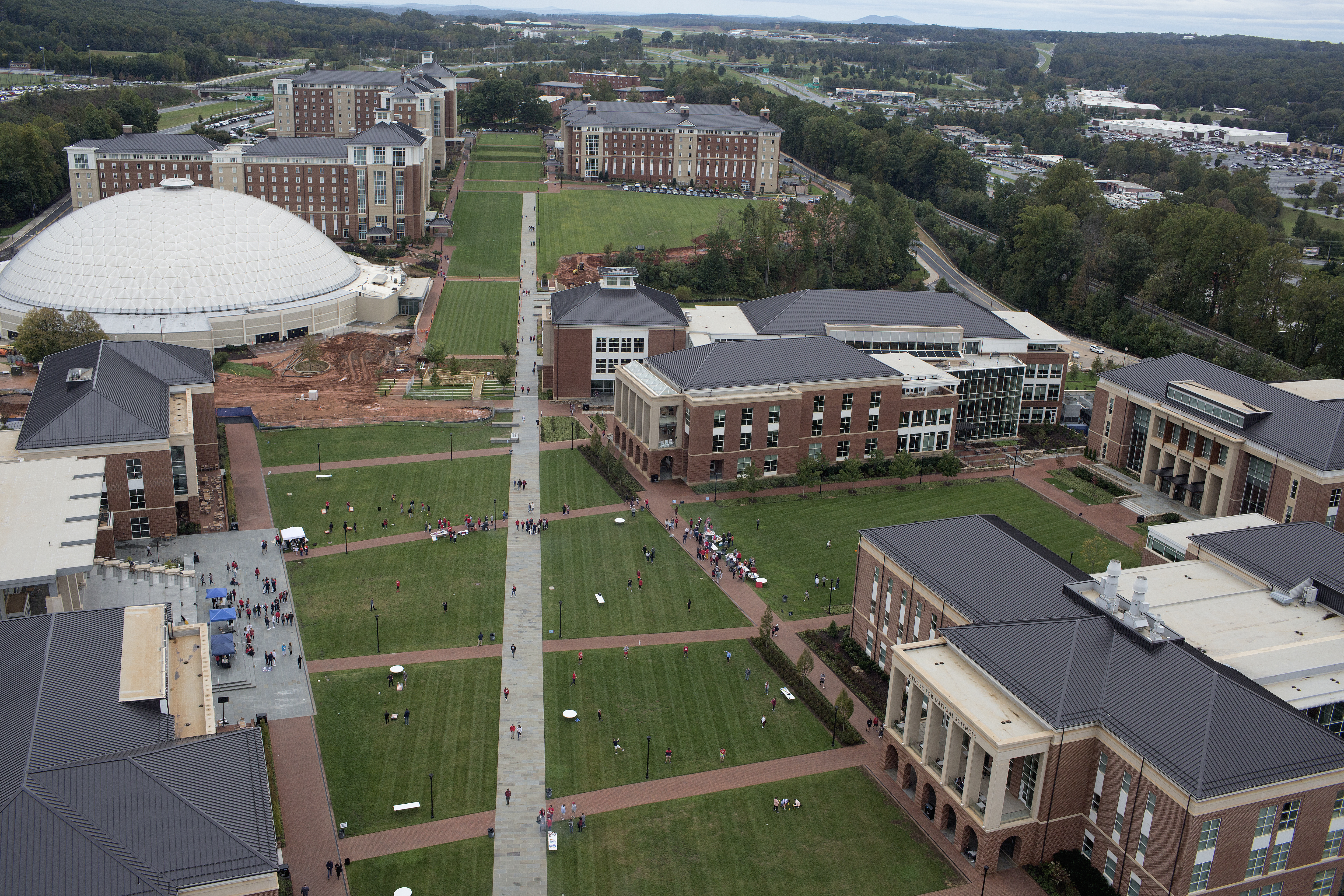You have /5 articles left.
Sign up for a free account or log in.

Jerry Falwell Jr. speaks at the Republican National Convention in 2016.
Chip Somodevilla/Getty Images North America
Jerry Falwell Jr. has no apologies and no regrets.
The former president of Liberty University spent years in the shadow of his famous father, and then stepped into the spotlight himself, before accusations of an alcohol-fueled sex scandal forced his abrupt exit from the institution he helped transform from a struggling college in a sleepy mountain town into a booming business enterprise with vast assets.
Falwell, born into evangelical royalty as the son of televangelist and Liberty University founder Jerry Falwell Sr., spent much of his adult life employed at LU, including 13 years as president. The younger Falwell, now 60, took over an institution on the brink of bankruptcy after his father’s death and turned it into an online education powerhouse that also boasts gleaming facilities, a $1.6 billion endowment and a successful Division I football team.
But when a lurid sex scandal forced Falwell to resign in 2020, his former underlings denounced him as a sinner from the same stage that Falwell once shared with high-profile political figures and A-list celebrities.
In the aftermath of his exit from Liberty, Falwell told Inside Higher Ed that he has spent more than a year battling health issues that have only recently improved. For roughly a year and a half, he struggled with lung clots caused by a genetic condition called spherocytosis. It took multiple hospital stays to get a proper diagnosis and find the right medication, he said.
1971: Jerry Falwell Sr. founds Lynchburg Baptist College, later renamed Liberty University.
1988: Falwell Jr. is hired at Liberty.
2005: Liberty begins its push into online education.
2007: Falwell Sr. dies and Falwell Jr. becomes LU’s president.
2015: Falwell endorses Republican candidate Donald Trump in the 2016 presidential election.
2017: Trump delivers LU’s commencement address.
2020: Falwell abruptly resigns amid controversy.
2022: Liberty reports record enrollment of 130,000, with 115,000 online.
Looking back, Falwell wonders if leaving Liberty saved his life, given the stress of the job coupled with his health issues, which he suggests might have gone neglected if he remained as president. His next move is undetermined. Asked about returning to higher education, Falwell offers only a “maybe.” He has been involved in commercial real estate development recently, he notes, and is considering a role in a publicly traded company.
Now, as Liberty searches for a new president to replace the interim at the helm, Falwell sees an institution devoid of business-minded leadership and trying to erase the legacy he built over decades on the campus where he spent much of his life—a place he’s now banned from entering. While his time as Liberty’s president is over, his battle with the university is only beginning.
“They’re trying to erase my legacy, my history, everything I did there, even though that was the main focus of my life, and it was a small part of the focus of my dad’s life. The way they’re running it now, they’re just throwing money around. They just don’t appreciate what it took to build Liberty. And the ones in charge, the executive committee, are mostly not businessmen, they’re preachers,” Falwell told Inside Higher Ed.
Falwell’s Fall From Grace
Falwell has been back in the public eye thanks to the recent release of the Hulu documentary God Forbid, an over-the-top tale of money, sex and power. The film recounts the entanglement of Falwell and his wife, Becki Falwell, with Giancarlo Granda, a Miami pool attendant who went into business with the Falwells and allegedly had a long-running relationship with Becki Falwell that her husband approved. While Falwell has admitted his wife had an affair with Granda, he has denied involvement, disputing the claim that he was present for multiple sexual encounters.
Falwell did not participate in the documentary and has rarely discussed the claims. He maintains the affair eventually became an extortion scheme, with Granda seeking a payout.
In an interview with Inside Higher Ed, Falwell brushed off the accusations in the documentary, sidestepping allegations of sexual impropriety, and declined to say whether he had seen the film.
“As much as we’d love to expose all the lies and half-truths that have been told, my lawyers have advised me not to comment on it because of the litigation,” Falwell said.
The film, relying heavily on Granda’s narrative, rehashes the competing claims that led to Falwell’s sudden resignation and the lawsuits that ensued. Falwell claims LU can’t point to any policy that he has broken, whereas board members argue that he deceived them by withholding information about his wife’s affair and the alleged extortion by Granda while negotiating a plum exit package in 2019.
When he stepped down from Liberty in 2020, Falwell was in an enviable position, running an institution with a $2 billion endowment and a student population of around 100,000. He also had regular access to then president Donald Trump, whom he had endorsed in the 2016 presidential election. (Falwell told Inside Higher Ed that he still maintains contact with Trump and has concerns about the integrity of the 2020 election that put Joe Biden in the White House.) Though Falwell’s actions often drew the ire of progressive students and alumni, he enjoyed broad support from the conservative community.
During his time at Liberty, the campus was a frequent stop for conservative politicians, hosting Trump on more than one occasion as well as Mike Pence, Ted Cruz, Mitt Romney, Jeb Bush, Ben Carson and celebrities such as Chuck Norris, Glenn Beck and Mel Gibson. Even liberal politicians such as Bernie Sanders and former president Jimmy Carter spoke at Liberty.

Though Falwell had dabbled in politics before, it was the 2016 election that thrust him to the forefront of the evangelical world. He became an ardent defender of candidate and then president Trump, even as Trump spouted racist comments and bragged about sexually assaulting women. No matter how shocking Trump’s conduct, Falwell supported him, putting himself and Liberty in the spotlight. But ultimately it was Falwell’s own Trumpian tactics—including a string of controversial social media posts and actions—that prompted the board to raise concerns about his erratic behavior, according to court records, jeopardizing his job at Liberty.
In early August 2020, Liberty’s board asked Falwell to take a leave of absence. Court documents indicate that Becki Falwell had contacted the board out of concern for her husband’s “excessive use of alcohol,” and trustees sought to place Falwell in rehab during an agreed-upon sabbatical. (Falwell notes that drinking alcohol was not prohibited in his employment contract or in Liberty University’s staff handbook.)
But Falwell didn’t enter rehab. A few weeks later, the board was blindsided by the conflicting accounts of the Granda affair and asked Falwell to resign. While Falwell told The Washington Examiner that he was never involved in what he described as an affair turned extortion plot, Reuters reported that Granda claimed to have been manipulated by the Falwells.
Removed from Liberty, Falwell suddenly found himself exiled from his life’s work, battling in court and in the press against the powerful evangelical institution he had spent years building up. What was once a humble Bible college had become a major cultural force. And while Liberty had wielded immense power against its critics under his leadership, Falwell now found himself on the receiving end of the hostilities.
The Legal Battle
While much of the battle between Falwell and Liberty has taken place in the court of public opinion, he has squared off with his former employer in actual courtrooms as well. Falwell first sued Liberty in October 2020, alleging the university had defamed him and breached his contract—a lawsuit he has since withdrawn.
Then, in April 2021, Liberty filed a lawsuit against Falwell, claiming he breached his contract and fiduciary duty by withholding information during a contract renegotiation about the alleged extortion plot against him. LU’s lawyers claim that Falwell “knowingly withheld from Liberty material information that would have altered the nature” of 2019 contract negotiations. The lawsuit alleges Falwell used the renegotiations to sweeten his exit package.
Liberty is seeking more than $10 million in damages.
Falwell has denied all wrongdoing alleged by the university. In fact, he claims that the university itself has cleared him on various charges after a lengthy investigation by a forensic accounting firm and a legal firm that allegedly cost the university millions of dollars.
“I’ve been told by several board members—and Liberty’s attorney told my attorney—that they found no financial malfeasance, no wrongdoing, no self-dealing, all the things I was accused of. And when the executive committee announced the investigation, they made a big public splash about it. But they never told the public what I was told privately: that they didn’t find anything.”
Liberty University did not respond to multiple requests for comment.
Falwell’s Liberty Legacy
Liberty today bears little resemblance to the institution Falwell took over in 2007. The university now boasts gleaming brick-and-glass buildings on a bucolic campus framed by nearby mountains. The athletic facilities are world-class and home to teams that have been consistently successful. Construction on campus has boomed over the years, with more projects in the works. Falwell said he oversaw nearly $1.6 billion in construction projects during his time as president.
Falwell has called planning and developing LU’s campus a form of art—his masterpiece. He points to a long list of accomplishments, especially on the business side, that show an explosion in enrollment and revenues as Liberty gained momentum under his leadership.
His father laid the foundation, he has said, but he built the house. Among other things, Falwell pushed Liberty to embrace online education, dramatically expanding Liberty’s reach when high-speed internet became widely available in 2005.
A recent press release from the university touted 115,000 online students for the 2022–23 academic year.

Falwell is proud of the competitive athletics program he built, especially the football team, which made the jump to the NCAA’s top division in 2019 and is set to play in its fourth consecutive bowl game this year. Falwell even showed up to the stadium this fall to celebrate LU’s blowout win over Brigham Young University, carefully navigating around his campus ban.
“I knew exactly where the line was between the city right of way and Liberty property, because I drew it,” Falwell said. “So I walked right up to the front entrance of the stadium and celebrated with some parents and got dozens and dozens of pictures. I put it all up on Instagram.”
While Falwell stayed on city property that day, his critics believe he crossed other lines—ethical ones—during his time at Liberty. Some have accused him of treating the university as his personal fiefdom and enriching himself and his family while acting in his professional capacity.
Dustin Wahl, a 2018 Liberty graduate and co-founder of Save71, an alumni and student group pushing for leadership change at LU, believes Falwell strayed too far into politics with his unflinching loyalty to Trump. He accuses Falwell of misusing Liberty’s thrice-weekly convocation as a stage to host right-wing media personalities and various figures from the Trump world.
Other LU graduates have accused Falwell of muzzling the student newspaper in an effort to crack down on coverage critical of Liberty and prevent publication of any anti-Trump sentiments.
Wahl, who was an undergraduate during Trump’s campaign in 2015, would have liked to see the board rein Falwell in then. But he suggests the opposite happened, with Falwell leveraging control over trustees after a public clash with Mark DeMoss, the chairman of the board’s executive committee, who challenged Falwell on his Trump endorsement. Fellow trustees then asked DeMoss to step down. When he resigned, critics suggested that was the end of board accountability for Falwell.
Beyond the political realm, critics accuse Falwell of a lack of care around student safety. They allege that “the Liberty Way,” LU’s strict honor code, was weaponized to punish students who reported sexual assault. Instead of following up on the claims, administrators disciplined the students who brought the assault charges for alcohol-related offenses or other infractions, various lawsuits have alleged.
Earlier this year, Liberty settled one such lawsuit filed by 12 women and later joined by others, with some plaintiffs excluded. (One plaintiff in the case claims that she was initially offered a $5,000 settlement from the university.)
Falwell argues he was not involved in sexual violence oversight or LU’s Title IX office and therefore cannot be blamed.
“Liberty’s general counsel said that the president should be kept in the dark so nobody can accuse the president of picking favorites or doing favors for children of certain donors or whatever,” Falwell said. “So they kept me in the dark on any claim that was ever made.”
But critics suggest Falwell’s detachment does not absolve him of responsibility.
S. Daniel Carter, president of Safety Advisors for Educational Campuses, notes that while presidents are not directly responsible for overseeing sexual misconduct and other Title IX issues, they have an obligation to set the standards for how such matters are handled.
“It’s not necessarily that they might have been directly involved in doing it—it’s that they allowed it to happen. And, in fact, that almost complete detachment from sexual misconduct issues is what can lead to catastrophic systemic failure,” Carter said. “So for a president to be completely detached from sexual misconduct matters at their institution is extraordinarily irresponsible.”
Liberty’s Post-Falwell Era
When Falwell stepped down six months into the COVID-19 pandemic, he was replaced by Jerry Prevo, a longtime board member who is still the interim president. Liberty recently began a search for a new permanent president.
While Falwell’s critics have cheered his departure, Liberty remains unchanged in many ways. Like Falwell’s, the current administration has come under fire for alleged inaction on sexual violence on campus. And under Prevo, the Liberty Way still appears to be used as a weapon against people who bring claims of sexual assault, prompting a new lawsuit earlier this year from a student who claims she was punished in 2021 for reporting her sexual assault.
Liberty vowed to release the results of an internal investigation on sexual violence issues but, months later, has yet to do so.
“Liberty still hasn’t apologized or dealt with [Title IX issues] directly. There are minor changes that are being made. But there is a complete lack of transparency from the board and the current president,” Wahl said.
Save71 members are as critical of Liberty’s trustees as they were of Falwell and remain especially distrustful of Prevo.
“He was in his role because he was trusted by Falwell Sr., because he was a very politically active preacher in Alaska—he was loyal and would basically sign off on whatever the Falwells wanted. He was never the chair because of his credentials. In terms of how he’s behaved as president, it’s not much differently than I think that you could expect given his complete trust in the Falwells’ leadership throughout the entire time that they were in power,” Wahl said.
Prevo also shares Falwell’s impulse to push Liberty into the political realm; he was secretly recorded saying that one of the “main goals” of the university is to elect conservative candidates, Politico reported.
In the same conversation—with Scott Lamb, who was then an LU official and has since filed an active whistle-blower lawsuit against the university alleging various misdeeds—Prevo pushed back on concerns that political activity might jeopardize Liberty’s 501(c)(3) nonprofit status.
“I have a 50c3 church,” Prevo said, according to Politico. “For 30 years, I’ve known how to handle that and not get into trouble. The homosexual community has tried to take me down for at least 30 years, and they have not been successful because I know how to work the 50c3.”
Both Falwell and his many detractors question Prevo’s credentials to run a major university and point out that he is frequently gone from campus. His regular absence has even spawned a “Where Is Jerry Prevo?” Instagram account.
 “The president is gone more than he’s there. I don’t know how you run a college without being present,” Falwell said.
“The president is gone more than he’s there. I don’t know how you run a college without being present,” Falwell said.
According to flight records for Liberty aircraft provided by the Trinity Foundation, a nonprofit that monitors fraud by religious organizations, Prevo can often be found in either Anchorage, Alaska—where he had a church he has retired from—or Mesa, Ariz., where he maintains a residence.
Wahl suggests that “the entire board is unqualified” to be trustees, noting that many are on the board for their religious leadership—not their educational credentials or expertise.
For true accountability, Wahl believes Liberty needs entirely new leadership.
“What we think should happen if Liberty’s leaders woke up tomorrow morning and said, ‘We’re going to take responsibility for our previous actions and inactions and do something about it,’ there would be a lot of resignations from the board, including from Jerry Prevo, the president, who is more culpable than any other board member in the last 20 years of leadership at Liberty,” Wahl said.
Though Falwell is gone, allegations of impropriety by Liberty officials continue to emerge. For example, a lawsuit filed Nov. 17 alleges that a recently terminated employee witnessed illegal activity for years, both during and after Falwell’s tenure. John R. Markley, who worked full-time at Liberty from March 2017 until June 2022, claims that he witnessed “unjust enrichment due to the potentially fraudulent management of a network of charitable organizations by LU” as well as “potentially fraudulent management of corporate subsidies” and “improper use of assets” such as Liberty aircraft. The whistle-blower lawsuit goes on to claim that Liberty officials aimed to “thwart and/or obstruct the aims of Title IX and corrective measures to combat sexual assault on campus,” as well as various other issues that Markley claims he was fired for reporting.
Markley is seeking a judgment of $20 million from Liberty. Falwell is not named in the lawsuit.
Falwell’s Next Fight
Despite the dramatic end to his time at Liberty, Falwell will forever be attached to the university founded by his father. Now, back in good health and ever pugilistic, Falwell is preparing for his next fight with Liberty: how the university plans to use his father’s name and legacy.

Last fall Liberty announced plans for the Jerry Falwell Center, to honor the university’s founder. The facility, set for a 2024 opening, will highlight the senior Falwell’s accomplishments and work in establishing the university and will include a hologram of the famous televangelist delivering sermons. Though the price tag hasn’t been revealed, Falwell said “the shrine” to his father will cost around $35 million. He called the plans “Disneyesque.”
That appears to be the goal. Prevo said in a recent convocation that LU had “consulted with the people who do Disneyland [and] Disney World” and that “they can make him walk right out onto the stage as if he was literally there and speak to you and challenge you.”
Falwell considers the move an offensive use of student tuition dollars and compares it unfavorably to the tourist attractions found in Branson, Mo., and Las Vegas. Falwell plans to wage a legal challenge against the center, arguing that the family—not LU—controls the name, image and likeness of the elder Falwell.
“My dad never would’ve wanted a circus like that to be built in his name,” Falwell told Inside Higher Ed by text message. “He could’ve easily named LU for himself like earlier Christian schools—Oral Roberts University and Bob Jones University—but he intentionally did not because he didn’t want Liberty University to be about him. He wanted it to be for Evangelical young people what [the University of] Notre Dame is for Catholic young people. He said so often and publicly.”
In many ways, that vision has been realized, thanks to the younger Falwell, who built Liberty up only to suffer his own downfall.




